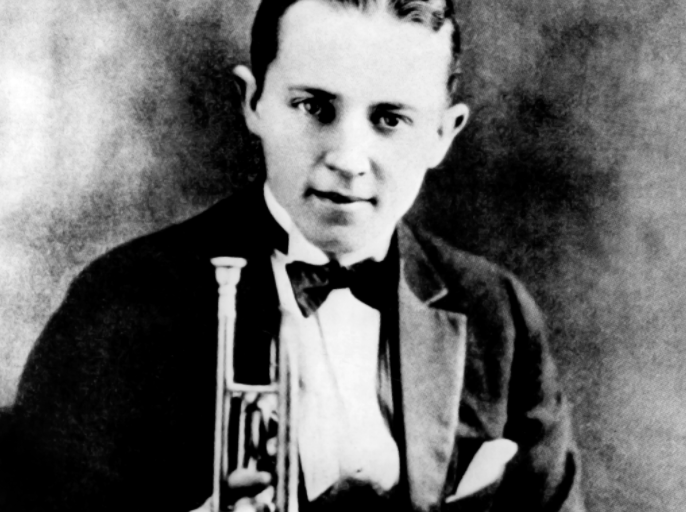Leon Bismark “Bix” Beiderbecke (March 10, 1903 – August 6, 1931) was an American jazz cornetist, pianist, and composer.
With Louis Armstrong and Muggsy Spanier, Beiderbecke was one of the most influential jazz soloists of the 1920s. His turns on “Singin’ the Blues” and “I’m Coming, Virginia” (both 1927) demonstrated purity of tone and a gift for improvisation. With these two recordings he helped to invent the jazz ballad style and hinted at what would become cool jazz in the 1950s. “In a Mist” (1927), one of a handful of his piano compositions and one of only two he recorded, mixed classical (Impressionist) influences with jazz syncopation.
A native of Davenport, Iowa, Beiderbecke taught himself to play cornet largely by ear, leading him to adopt a non-standard fingering some critics have connected to his original sound. He first recorded with Midwestern jazz ensembles The Wolverines and The Bucktown Five in 1924, after which he played briefly for the Detroit-based Jean Goldkette Orchestra before joining Frankie “Tram” Trumbauer for an extended gig at the Arcadia Ballroom in St. Louis. Beiderbecke and Trumbauer joined Goldkette in 1926. The band toured widely and famously played a set opposite Fletcher Henderson at the Roseland Ballroom in New York City in October 1926. He made his greatest recordings in 1927. In 1928, Trumbauer and Beiderbecke left Detroit to join the most popular dance orchestra in the country: the Paul Whiteman Orchestra.
Beiderbecke’s most influential recordings date from his time with Goldkette and Whiteman, although they were recorded under his own name or Trumbauer’s. The Whiteman period also marked a precipitous decline in his health exacerbated by the demands of recording, touring, and alcoholism. Visits to rehabilitation centers, and the support of Whiteman and the Beiderbecke family, failed to stop his decline. He left the Whiteman band in 1930 and the following summer died in his Queens apartment at the age of 28.
His death, in turn, gave rise to one of the original legends of jazz. In magazine articles, musicians’ memoirs,novels, and Hollywood films, Beiderbecke has been reincarnated as a Romantic hero, the “Young Man with a Horn”. His life has been portrayed as a battle against such common obstacles to art as family and commerce, while his death has been seen as a martyrdom for the sake of art. Beiderbecke remains the subject of scholarly controversy regarding his true name, the cause of his death, and the importance of his contributions to jazz.
This Jazz Inspiration Profile is sponsored by Sacramento Top 10 the best local list of Bed & Breakfasts, Restaurants, Museums, Home Improvement and more.
Top Bix Beiderbecke Songs
1. Singin’ the Blues
2. In a Mist
3. I’m Coming Virginia
4. Jazz Me Blues
5. Royal Garden Blues
6. At the Jazz Band Ball
7. Riverboat Shuffle
8. Davenport Blues
9. For No Reason at All
10. Since My Best Girl Turned Me Down
11. Sorry
12. Goose Pimples
13. Ostrich Walk
14. Clarinet Marmaladebr>
15. Wringin’ and Twistin’
16. There Ain’t No Sweet Man That’s Worth the Salt of My Tears
17. Rhythm King
18. Wa-Da-Da
19. Cryin’ All Day
20. Lonely Melody
21. Louisiana
22. Fidgety Feet
23. A Good Man Is Hard to Find
24. I’ll Be a Friend With Pleasure
25. Sugar
26. Tiger Rag
27. Way Down Yonder in New Orleans
28. Clementine
29. Changes
30. From Monday On
32. There’ll Come a Time


